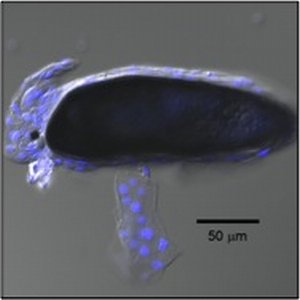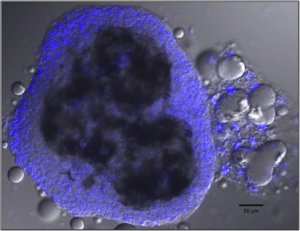Parallels between immunity and cancer reported …
 Parallels between immunity and cancer reported
Parallels between immunity and cancer reported
Same proteins involved, but cancer takes hold when response gets out of control, CCNY biologists Report
Tiny parasitoid wasps can play an important role in controlling the populations of other insect species by laying their eggs inside the larvae of these species. A newly hatched wasp gradually eats the host alive and takes over its body.
The host insect is far from defenseless, however. In Drosophila (fruit flies), larvae activate humoral immunity in the fat body and mount a robust cellular response that encapsulates and chokes off the wasp egg.
New research by Dr. Shubha Govind, professor of biology at The City College of New York, and colleagues reveals parallels between how this mechanism fights the wasp infection and the way blood cancer develops. “There are fundamental similarities in the processes,” she explains. “The response to wasp infection is similar to acute inflammation while the cancer is akin to chronic inflammation in mammals, where regulation of the response to an infection also goes out of control.”
Professor Govind reports that the immune system that counters wasp egg infection is highly restrained. The system works like a thermostat, with certain proteins detecting the infection and triggering the immune reactions. Once the egg has been destroyed the immune reactions come to a halt.
However, when the regulating mechanism goes haywire, cancer can develop. Through sumoylation, the correct balance between positive and negative factors is achieved, Professor Govind and colleagues report.
“There is strong evidence that the fundamental mechanism of regulation uncovered in flies also works in humans,” she notes. “Because of the molecular similarities between flies and mammals, it may be possible to use flies to test drugs for potential anti-inflammatory effects in human disease.” While such drugs would not cure cancer, they could control inflammation and, perhaps, delay cancer progression.
Other potential applications are in pest control for agriculture. Instead of using insecticides, parasitoids with the ability to suppress the hosts’ immune systems could be used to kill insect pests. Also, insecticides could be developed that, at very low concentrations, would weaken the immune systems of host insects and enable parasitoid eggs to succeed, Professor Govind adds.
The findings were published last month in “PLoS: Pathogens,” a peer-reviewed, open-access journal published by the Public Library of Science. Contributing scientists were: Indira Paddibhatla, Mark J. Lee, Marta E. Kalamarz and Roberto Ferrarese. The work was funded by the National Institute of General Medicine, U.S. Department of Agriculture and PSC-CUNY.


The immune system response in Drosophila to a wasp infection (above) is highly restrained, resulting in a thin layer of blood cells encapsulating the egg. However, blood cancer occurs (below) when there is an out-of-control response to a chronic inflammation, with a much thicker layer of blood cells.
* The above story is reprinted from materials provided by The City College of New York



















